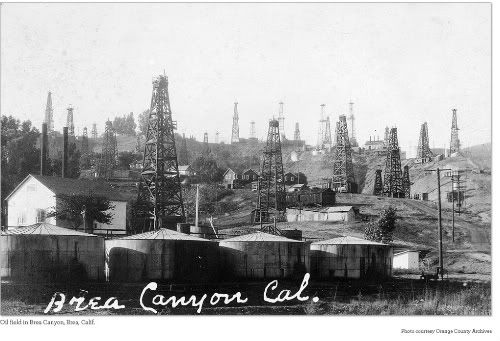Paul Des Granges was born in 1891 in Fullerton, CA. As a young man, he worked for the Brea Olinda oil fields, then as a road paver for Fullerton, then as a farmer. Eventually, his family owned a 40-acre orange grove in Fullerton. He was interviewed in 1971 by Anne Riley for the Fullerton College Oral History program. Here are recollections of Fullerton over the years from a man who was here from almost the very beginning of the town.
On Who Owned Fullerton Land before the Amerige Brothers
"Stearns' Ranch was all over here at one time. They owned quite a bit of that property here. It's an old Spanish land grant is what it was. You'd have to dig into some of California's history to get who Abel Stearn was, but he married a Spanish woman. He was a Yankee, and he knew how to get things."
On Working the Brea Olinda Oil Fields
"You had to work in those days! Well, if you got a Sunday off once in a while, you was in luck…We had twelve hour days, 365 days a year."
On Charles C. Chapman (orange rancher/Fullerton's first mayor)
"He had his own private drive-way for quite a few years, coming through there…State College to Acacia. He used to have to close it off at each end about once a year, a day or two, to hold it…When it [Fullerton] was incorporated, a good Christian member [Chapman] employed enough men to vote for him…that he knew would vote the right way for him…built the Christian church for them."
On Louis Plummer (Superintendent of Fullerton Union High School/Ku Klux Klan Member)
"Smooth talker. Plummer came here, and he was a…I guess…gosh, I guess the old fellow did teach…I never had him…Oh, he was quite a church man. Pretty smooth…And he got a building named after him, and all that. And he wrote a book. Oh, he was quite a man."
On Who Provided Water for the Community During the 1938 Earthquake
"I knew very well that the water tank out by the stallion barn had come down, because water had all come down through there and down through the yard. And we didn't have any water there at the house that night, except a couple of ten gallon cans that we got down in Mexican Town. [At this time, Mexican Americans lived in segregated work camps called "Citrus Towns" or "Mexican Towns"] They were on the hillside below the place…and we got a couple of ten gallon milk cans full of water, and that's all. We had twenty-one people there in the yard that night."
On Hippies
"A lot of these hippies that are coming in here, they've got to be fed or something, or taken care of, and they've got to have the money enough to pay the rent for the rent for the thing…I don't know."
On the Decline of the Citrus Industry
"Well, they call it progress. I guess so…The tax bill got too big. Orchards…you couldn't make decent sized oranges to save your soul in this part of the country. We don't know to this day, for an honest fact, any more than to say that it's just the smog that did it, that's all."

